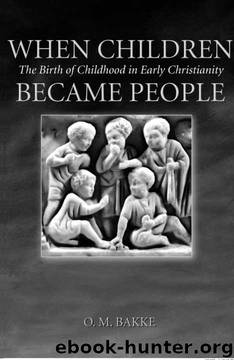When Children Became People: The Birth of Childhood in Early Christianity by O. M. Bakke

Author:O. M. Bakke [O. M. Bakke]
Language: eng
Format: epub
Published: 2007-05-10T09:38:00+00:00
Jerome
Let us recall the background to Jerome's two letters about the rearing of children. Two parents have consecrated their small daughters to a life of virginity, and have asked him for advice about how they should bring the girls up with this goal in view. This means that Jerome's observations about this topic in these letters envisage children destined for a life with extraordinary obligations and demands; accordingly, we cannot simply assume that Jerome thought that his words were applicable to children in general. Nevertheless, given that he was a zealous adherent of ascetic ideals, it is reasonable to think that he would consider the basic principles in the upbringing he prescribes here as relevant to all children.
Jerome begins Epistle 107.4 with an exhortation that Paula "must learn to hear nothing and to say nothing but what belongs to the fear of God," and this can be taken as a summary of how the girls are to be formed for a life in consecrated virginity. We have seen how the Didascalia and the Apostolic Constitutions admonished parents to limit their children's contact with pagan youngsters of their own age, in order to shield them from bad influences. This referred primarily to older children, that is, teenagers. Jerome emphasizes much more strongly the importance of isolation from the surrounding world, and affirms that the girls must be sheltered from negative input from their earliest years. This is because he is convinced that it is difficult in later life to shake off the vices one has learned as a little child: "Early impressions are hard to eradicate from the mind."121 Accordingly, the girls must always be under the supervision of persons of high moral integrity, and all the influences to which they are exposed and everything they do must be rigorously invigilated in view of their formation for what Jerome defines as a life in the fear of God.
They must not learn impure words, and instead of worldly songs, they must learn to esteem "the sweetness of the psalms" while their tongues are "still tender." Jerome says that when Paula is a little older, she must be "deaf to the sound of the organ, and not know even the uses of the pipe, the lyre, and the cithern""'-instruments associated with secular music. When she practices putting letters together to form words, these should not be chosen at random, but should be words with a spiritual meaning, for example the names of the prophets and apostles.123
Even when she is small-four or five years old-she must be kept apart from "boys with their wanton thoughts." A girl should spend her time only with other girls; "she should know nothing of boys and should dread even playing with them. 11121 When she is a little older, young men must not be allowed to "greet her with smiles," nor should any "dandy with curled hair pay compliments to her. "I" She must never show interest in younger men, nor "turn her eyes upon curled fops ."126
Download
This site does not store any files on its server. We only index and link to content provided by other sites. Please contact the content providers to delete copyright contents if any and email us, we'll remove relevant links or contents immediately.
Cecilia; Or, Memoirs of an Heiress — Volume 1 by Fanny Burney(32558)
The Great Music City by Andrea Baker(32018)
Cecilia; Or, Memoirs of an Heiress — Volume 2 by Fanny Burney(31956)
Cecilia; Or, Memoirs of an Heiress — Volume 3 by Fanny Burney(31941)
We're Going to Need More Wine by Gabrielle Union(19046)
All the Missing Girls by Megan Miranda(16023)
Pimp by Iceberg Slim(14506)
For the Love of Europe by Rick Steves(14121)
Bombshells: Glamour Girls of a Lifetime by Sullivan Steve(14073)
Talking to Strangers by Malcolm Gladwell(13370)
Norse Mythology by Gaiman Neil(13363)
Fifty Shades Freed by E L James(13239)
Mindhunter: Inside the FBI's Elite Serial Crime Unit by John E. Douglas & Mark Olshaker(9339)
Crazy Rich Asians by Kevin Kwan(9291)
The Lost Art of Listening by Michael P. Nichols(7506)
Enlightenment Now: The Case for Reason, Science, Humanism, and Progress by Steven Pinker(7311)
The Four Agreements by Don Miguel Ruiz(6765)
Bad Blood by John Carreyrou(6621)
Weapons of Math Destruction by Cathy O'Neil(6279)
